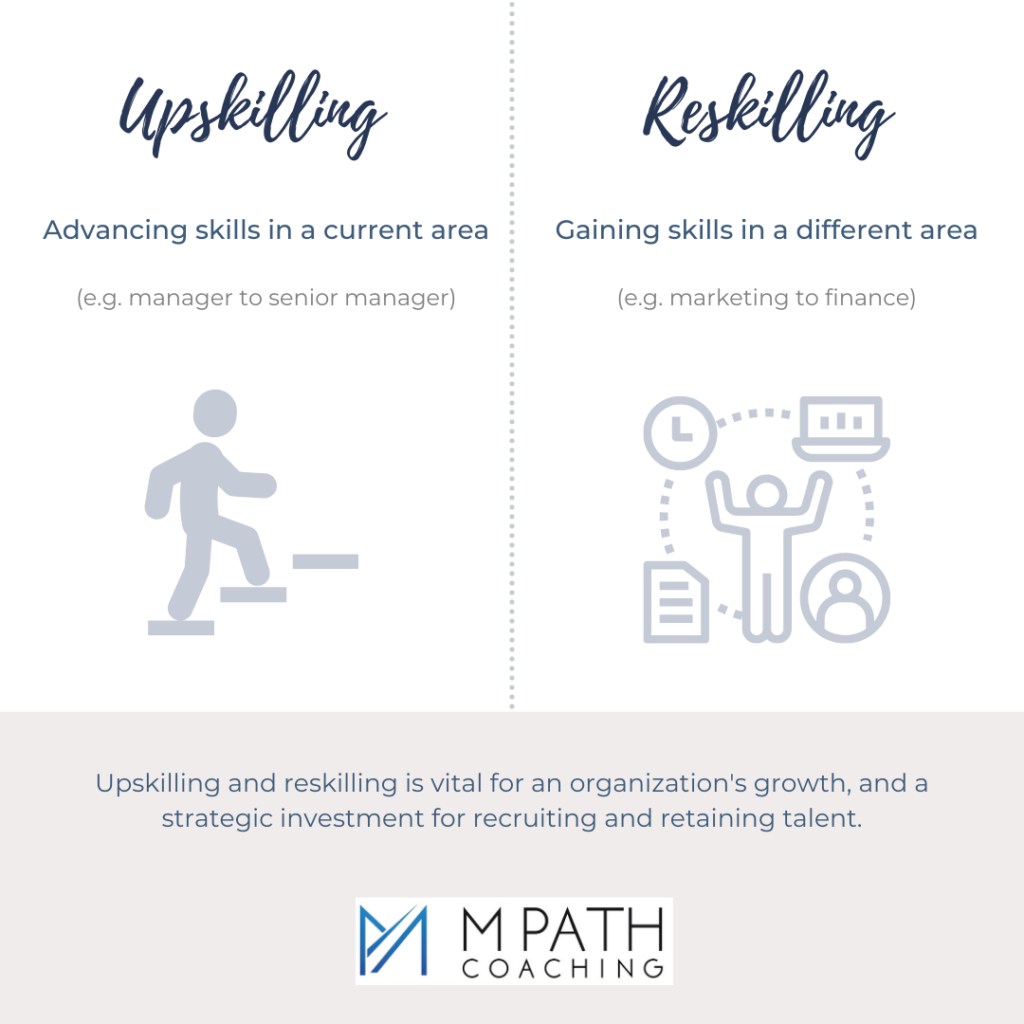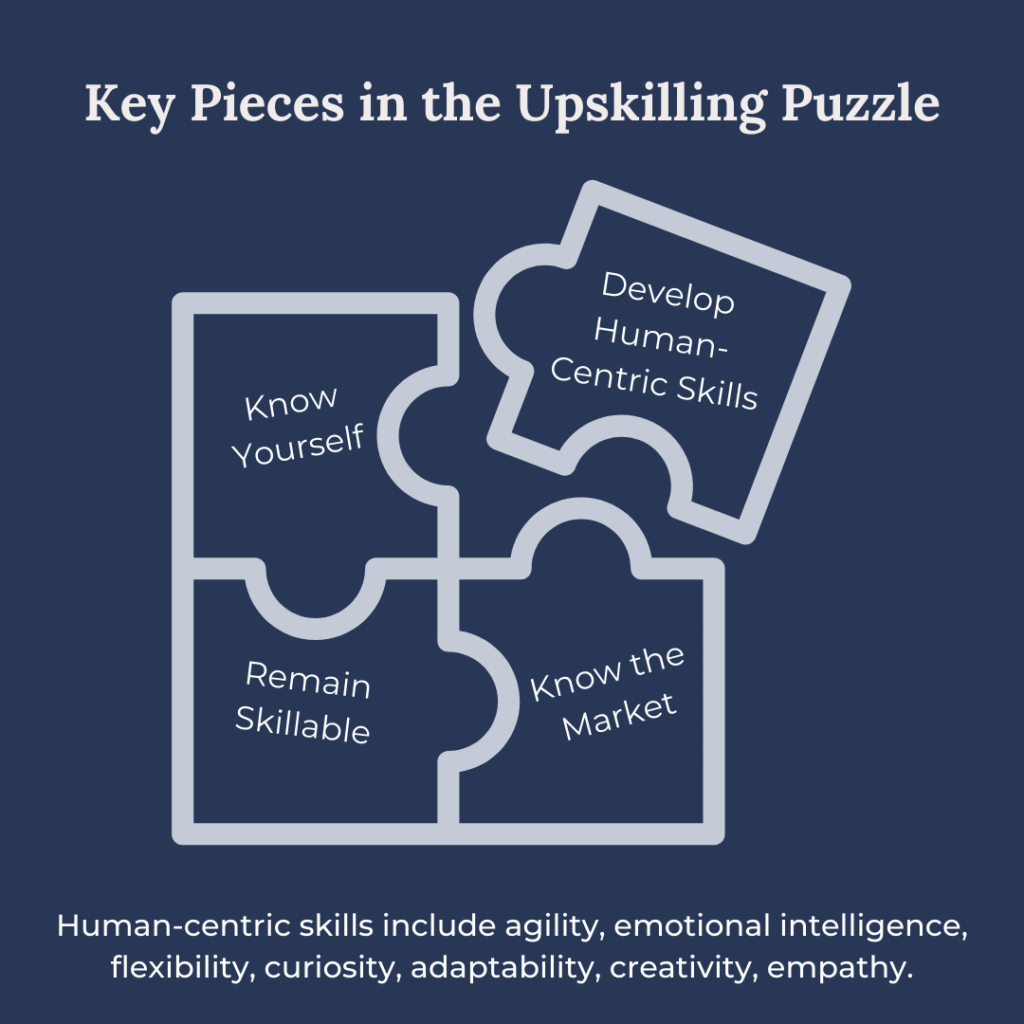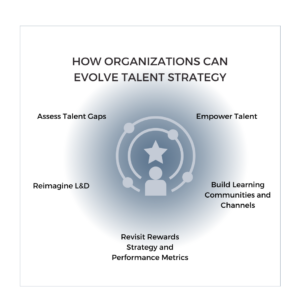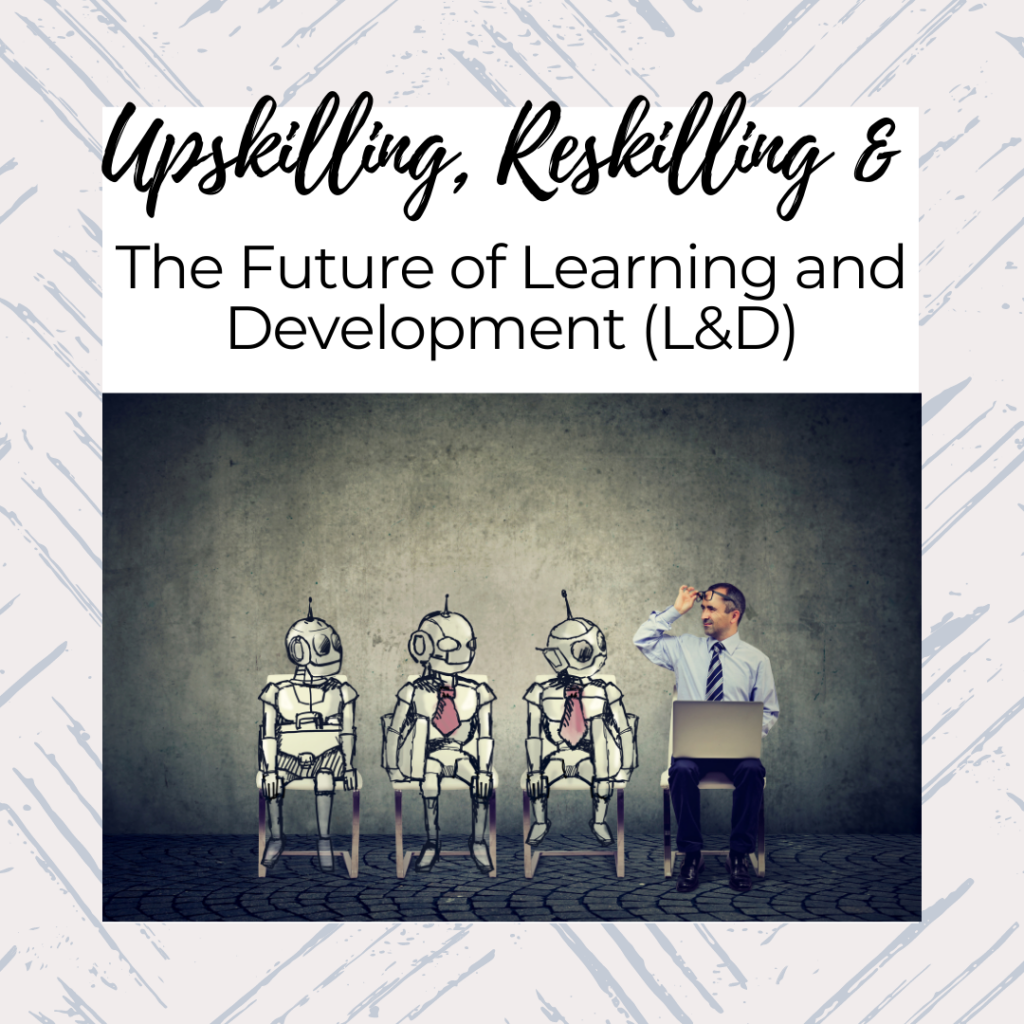While change is not new, an accelerated rate of change, combined with the pandemic exposing a widening skills gap, underscores how we are at a unique inflection point. As technology continues to advance, we can look at how to self-innovate, manage our professional development, and to an extent, our destiny. We can incorporate upskilling and reskilling into our professional development plans and take our talent to new heights.
Upskilling refers to advancing our skills within a role (e.g. manager to senior manager), whereas reskilling means gaining skills in a different area (e.g. marketing to finance). Prior generations could leverage their skills for longer periods of time; however, today skills are getting outdated much faster due to the pace of change.
Can your job be automated? Chances are if you are doing repetitive tasks, the answer is yes. When automation takes over the work we do, how do our roles change? What are our options? How can we regain control of our career and shape our future?
Know Thyself
We can start by examining our human-centric skills including leadership, emotional intelligence, creativity, and empathy. Those skills may be more challenging to automate. We are not only learning these skills in the workplace. The pandemic and other crises we face teach us human skills like resilience and flexibility.
Reflect on times where you had to endure, adapt and persevere. How did you overcome adversity? What skills did you use? Take inventory of your skills, strengths, values, and what energizes you. As you gain a deeper understanding of yourself, you can map your skills to the marketplace and create a blueprint to bridge gaps.
Know the Market
The next decade will bring about some unknown jobs. Companies are predicting skills and competencies needed for the future, including digital, data, cybersecurity, project management, leadership, and creative problem-solving. Companies may continue to leverage contractors and freelancers to quickly fill talent gaps for specific skills.
By having a pulse on the macro environment, you can feel empowered to make informed decisions and understand emerging changes. Learn about trends and where your abilities intersect with the marketplace. Where can you solve problems, integrate new ideas, and make an impact? This process will be fluid as you continue to evolve.
Key trends in the workplace include:
- Digitization and emerging technology will impact how we work
- Change management is needed to drive adoption of new technologies, identify barriers to change, and assess impact
- Influx of new generations will reshape how we collaborate and get work done
- Mental wellness is a strategic priority to enhance culture, engagement and retention
- Diversity, equity, inclusion and belonging will be a broader imperative at a systemic level
- A shift to more hybrid roles will require advanced cognitive skills, including communication, creative problem-solving, conflict resolution and relationship-building
Remain Skillable
When we think about technology replacing certain jobs, it is normal to feel some anxiety. However, many new jobs will be created as they were during the last industrial revolution. For example, the mail carrier industry evolved from riding horses, to driving cars, planes and drones. As customer service is automated, new jobs may focus on providing better guest experience and leveraging data to anticipate customer needs.
With technology advancements, digital and data literacy becomes increasingly important. This does not mean we need to become digital experts; in fact, we can be technology-agnostic. Rather than getting overwhelmed by the technical details, learn why specific technology is being implemented and how it creates change. Remain flexible, open-minded and curious, and embrace technology that collides with your work.
For many of us, upskilling and reskilling takes time. Policies should be considered to accommodate learning and financial gaps as the workforce adapts. We can also take a proactive approach by drafting our own learning and development plans.

The Difference Between Upskilling and Reskilling
Remain Flexible
In addition, hybrid roles will continue to grow as companies look for talent that can flex across different functions.
Hybrid roles can be a combination of two or more roles. Hybrid roles also may combine technical skills and human-centric skills such as communication, conflict resolution, and change management.
Examples of hybrid roles include:
- Engineers who can communicate effectively and lead teams
- HR professionals who can analyze data
- Designers who can develop and test their designs
- Project managers who can define the strategy
- Sales managers who can provide customer service and project oversight
To what degree are you working on both your subject matter/technical expertise and your human-centric skills?
Always be Upskilling
Always be upskilling. Even C-level executives need to upskill. Fixed mindsets including “we’ve always done things this way” will limit progress and render leaders obsolete. Examine underlying desires to remain within the confines of the status quo and challenge those beliefs. This requires a fundamental mental and behavior shift, which takes courage, practice, patience, and self-awareness.
Below are strategies to advance your skillsets and mindsets.
Take Initiative and Invest in You
- Invest in your own quarterly/annual learning plan and play an active role in your development. Do not wait for your employer to invest in you, as it may not always be feasible
- Seek experiential learning, including projects that will stretch you outside your comfort zone
- Make learning part of your every day. Ask yourself: What am I learning? How can I improve? Even bite-sized learning can promote shifts over time
- Explore available resources to build skills (e.g. “mini” 2-day/2-week certification programs, online courses, books, articles, podcasts, etc.)
- Seek support. This includes mentors, coaches, colleagues, family and friends who can boost your learning and open doors to opportunities
- Find ways to improve wellbeing, e.g. through self-care and community-care. This creates space and energy for higher level learning and leading
Advance Your Human-Centric Skills
- Reflect regularly. What did you notice when you completed a task? Reflecting on behaviors can expand your analytical and creative skills
- Adopt a beginner’s mindset of continual learning and curiosity. Even if you bring expertise, put that aside in favor of wanting to learn something new with every experience
- Practice new skills in your day-to-day. This can include eating with your less dominant hand, taking a different route, using a new app, or doing something routine in a new way
- Be willing to color outside the lines and expand your existing scope of work. Be mindful if you start thinking or saying “that’s not my job”
- A great way to learn is to teach. Practice teaching a topic, even if just to an audience of one
- Identify barriers to change. Learn to be more comfortable with the unknown and see discomfort as an avenue for growth
- Reframe failure as learning
If we’re not failing, we’re not learning, if we’re not learning, we’re not growing, and if we’re not growing, then what are we doing?
—Manisha Dhawan
Once you’ve acquired new skills, how are you telling your story? Are you sharing with others, tapping into your new skills and leveraging them on and off the job? Reflect on your journey, and celebrate how far you have come.

Human-Centric Skills are a Key Piece in the Upskilling Puzzle
What Can Companies Do To Upskill and Reskill Talent?
When employees feel a sense of purpose, connect to their work, and are given opportunities to grow, they become brand ambassadors. Many companies will consider employee upskilling and reskilling as a strategic investment in talent strategy, including recruitment and retention.
To develop talent, companies can:
Assess Talent Gaps
- Gather data on industry-shaping trends, identify skill gaps, and create a plan of action to fill those gaps
- Assess how much knowledge sharing vs. hoarding is taking place within teams. Reward knowledge-sharing
Empower Talent
- Empower employees to co-author their learning path based on their talents and passions, in alignment with company objectives
- Personalize the learner journey and allow for flexibility as it evolves
- Integrate learning into day-to-day so it is embedded into work rather than another to-do item
- Embed learning in the culture. Create opportunities for project rotation, experiential learning and shadowing
- Cultivate inclusion by inviting everyone to speak and share their perspectives. Do not miss the opportunity to elevate introverts, quiet leaders, frontline workers, people with different backgrounds and abilities, and other hidden gems within the organization
- Believe your talent can accomplish more than they know, and beyond the boundaries of their current role
Build Learning Communities and Channels
- Build learning communities of practice and social learning spaces such as chat rooms, Slack channels, and other platforms where colleagues can support and teach each other
- Partner with educational institutions, technology companies, and other industries to invite additional opportunities for learning and development
Revisit Rewards Strategy
- In addition to metrics and project results, assess what else can be rewarded, e.g. relationship-building, compassion, knowledge-sharing, etc.
- Recognize not only the digital natives, but also the digital adopters

Reimagine Learning and Development (L&D)
The digital divide and disparities in access will preclude everyone from achieving opportunities to upskill and reskill. At a systemic and institutional level, we still have a lot of work to do to disrupt learning and development. New learning and education models should promote skills development at an earlier age, prior to entering the workforce.
Leveraging a design thinking approach, we can put the learner at the center of the journey, map out their experiences, identify pain points and ideate ways to reimagine learning at all ages and career stages. We can also plot the trainer’s journey and identify how to innovate the role of an educator and L&D leader.
What’s Next: The Future of Upskilling and Reskilling
The future of upskilling and reskilling may include technology platforms where learning is decentralized and learning mechanisms are disrupted. As work transforms, we can tap into the convergence of technology and learning, including:
- Best practice sharing, peer-to-peer and community-based learning as powerful ways to incorporate upskilling and reskilling
- Gamification, crypto-currencies, and personalized learning to incentivize learners as they practice upskilling in real-time, connect to other cohorts and experts, and share feedback seamlessly
- Virtual Reality (VR) to reinforce behaviors like empathy by creating environments where learners can experience other perspectives
- Artificial Intelligence (AI) to augment roles so learners can offload tasks and advance skills in other areas
- Machine Learning (ML) to predict behavior and provide targeted learning experience based on learner preferences

Summary
As we upskill and reskill, we remain vital to work even as new technology emerges. We can prepare for change starting with ourselves, including our mindsets, skillsets, and behaviors. We can have empathy for each other as we embark on radical change and traverse the journey at difference paces.
As the relationship between humans and technology continues to evolve, will machines ever fully replace us in the workplace? Anything is possible, but for now, our human-centric skills are our differentiator and superpower.
© 2021 Manisha Dhawan. All rights reserved.
For more inspiration and tips, please follow me on LinkedIn. L&D

Manisha Dhawan, Founder and CEO of MPath Coaching, is a certified professional coach (CPC), MBA and management consultant with 2 decades of experience leading digital innovation and change management initiatives across multiple industries. As a design thinking specialist and lifelong learner, Manisha is passionate about empowering executives to advance leadership skills, maximize team potential, and drive innovation forward. In addition to corporate coaching, Manisha works with professionals on career strategy and human skills development.

